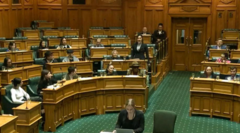The bill, supported by President Macron, marks a significant shift towards legalizing assisted dying in France as it heads to the Senate for further consideration.
French National Assembly Approves Assisted Dying Legislation

French National Assembly Approves Assisted Dying Legislation
New law sets the stage for assisted dying rights in France for terminally ill patients.
The French National Assembly has passed a groundbreaking law allowing those in the final stages of terminal illnesses to seek assisted dying. The bill received overwhelming support, winning 305 votes to 199, and is now set to be reviewed by the Senate before a second reading in the National Assembly. This legislation, backed by President Emmanuel Macron, could make France the eighth European Union country to permit some form of assisted dying by 2027.
Unlike more permissive laws in the Netherlands and Belgium, the proposed French legislation stipulates that only patients suffering from "serious and incurable diseases" that are "life-threatening and in advanced or terminal phases" may qualify. Patients must also experience "constant physical or psychological suffering" and must explicitly express their intention to die. A mandatory waiting period of 48 hours is required for patients to confirm their decision.
Upon approval, patients would self-administer a lethal dose, potentially with assistance from a medical professional if they are unable. A doctor, following a peer consultation, would authorize this procedure. MPs were given free rein to vote, a reflection of the diverse opinions that cross party lines, although many from the center and left supported the bill while it faced opposition from conservatives and the populist right.
Critics of the bill express concerns that the vague definitions included could pave the way for assisted dying to extend to patients who may still have years to live. There are fears that elderly individuals, especially, could feel pressured to choose assisted dying to avoid being a burden to their families. A protest against the bill featured a poignant message from a 44-year-old woman with Parkinson's disease, indicating the potential risks involved.
Another bill regarding the right to palliative care was passed without opposition, with reports suggesting that nearly half of the French populace needing palliative care currently lacks access. Macron referred to the approval of both bills as "an important step" and emphasized the gradual opening of a path toward fraternity concerning these sensitive issues.
While medical professionals who oppose assisted dying will not be required to participate, attempts to hinder the act could lead to a two-year prison sentence. A proposed amendment to criminalize incitement to assisted dying was dismissed, further highlighting the contentious nature of the discussion surrounding this legislation. Prime Minister François Bayrou, a practicing Catholic, noted he would abstain if given the opportunity to vote on the measure.
Unlike more permissive laws in the Netherlands and Belgium, the proposed French legislation stipulates that only patients suffering from "serious and incurable diseases" that are "life-threatening and in advanced or terminal phases" may qualify. Patients must also experience "constant physical or psychological suffering" and must explicitly express their intention to die. A mandatory waiting period of 48 hours is required for patients to confirm their decision.
Upon approval, patients would self-administer a lethal dose, potentially with assistance from a medical professional if they are unable. A doctor, following a peer consultation, would authorize this procedure. MPs were given free rein to vote, a reflection of the diverse opinions that cross party lines, although many from the center and left supported the bill while it faced opposition from conservatives and the populist right.
Critics of the bill express concerns that the vague definitions included could pave the way for assisted dying to extend to patients who may still have years to live. There are fears that elderly individuals, especially, could feel pressured to choose assisted dying to avoid being a burden to their families. A protest against the bill featured a poignant message from a 44-year-old woman with Parkinson's disease, indicating the potential risks involved.
Another bill regarding the right to palliative care was passed without opposition, with reports suggesting that nearly half of the French populace needing palliative care currently lacks access. Macron referred to the approval of both bills as "an important step" and emphasized the gradual opening of a path toward fraternity concerning these sensitive issues.
While medical professionals who oppose assisted dying will not be required to participate, attempts to hinder the act could lead to a two-year prison sentence. A proposed amendment to criminalize incitement to assisted dying was dismissed, further highlighting the contentious nature of the discussion surrounding this legislation. Prime Minister François Bayrou, a practicing Catholic, noted he would abstain if given the opportunity to vote on the measure.






















